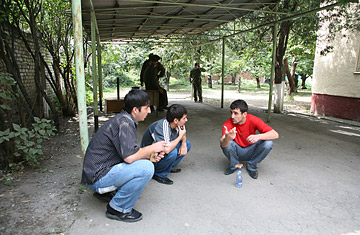
Ramaz Kuchiev, far right, a former soldier in the Russian army and other men wait for their papers to be processed so they can join the Russian army to join the fighting in South Ossetia and Georgia
The Vladikavkaz City Recruiting Center in the Russian territory of North Ossetia lies just outside the main town, through a tall, steel gate. Inside, along a small driveway overlapped by tall pines, lie a parking lot, pavilion and fruit orchard. A low, two-story concrete building with peeling paint serves as the recruiting center. Men in clean, dark green fatigues organize would-be recruits. They are mostly men in their 50s and 60s who have already served but are too old now. Lots of gray hair and mustaches, gold teeth and cigarettes.
Around the courtyard, the potential recruits, men of all ages, squat and stand. There are half a dozen in their 20s; at least twice as many older men, some as old as 50. A group of 10 Cossacks — in their traditional blue breeches with a wide red stripe down the side, green tunic bedecked in medals and tall black riding boots — forms to one side. One man has a curled handlebar mustache and watery pale-blue eyes. The men in this group won't talk to the press and keep walking off to stand and talk in a circle in the orchard. But one told a reporter earlier that he had come all the way from Siberia to serve in the Russian operations across the border in Georgia and its breakaway region South Ossetia. They look like a rough, hard bunch.
A tall, athletic Serb in his mid-40s, with blue eyes and curly long blond hair, comes into the courtyard. He walks over to the group of Cossacks, picks the oldest one out of the group and gives him a big hug and a kiss on each cheek. According to two of the men in the courtyard, the Serb, who is wearing new fatigues and slightly worn Asolo hiking boots, had fought Bosnia and is now there to fight in South Ossetia and Georgia. He may have fought in Chechnya, but no one will say. I talk to him for a moment. He speaks some English but is more comfortable in his lightly accented Russian. "I've come to fight in South Ossetia alongside the Russians," he says.
The older men in the group of would-be recruits sit in a row on a bench smoking cigarettes. Some carry plastic red-white-and-blue-striped rice bags. The few recruiters who agree to be interviewed tell similar stories. They accuse the American and Western press of lying about the events in Georgia. No one believes that the Russians have invaded Georgia and that Tbilisi and other cities have been bombed. Because the Russian press has not reported it, they say, it cannot be true. A rumor widely circulated is that black soldiers have been spotted fighting on the Georgian side. This is seen as incontrovertible evidence that America is helping Georgia with military aid. There is widespread, anti-American sentiment here.
That's one of the reasons men continue to trudge into the recruitment center as the morning unfolds. "Hopefully I will go to serve tomorrow," says Ramaz Kuchiev, 27, who has arrived from Mazdok, a city in North Ossetia. "Probably we will go to Tskhinvali. There is a group of 50 of us that are prepared to serve right now." Kuchiev has amber eyes and a calm but intense demeanor. He served his two years in the Russian army at a base near Moscow. Now he is unemployed; he is wearing a bright red shirt and pointy black shoes. "I want to go to Tskhinvali. The Georgians shot small children there. I want to go kill Georgians."